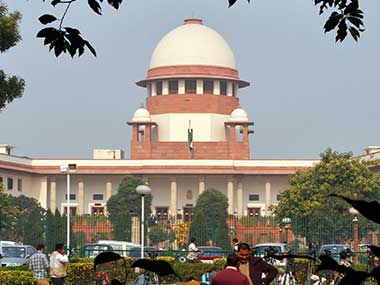In 2013, the collegium of the Punjab and Haryana High Court — comprising the then chief justice (now Supreme Court judge) AK Sikri and justices Jasbir Singh and SK Mittal — had recommended the names of eight advocates to be promoted to the high court. The lawyers recommended for elevation were Manisha Gandhi (daughter of former chief justice of India AS Anand), Girish Agnihotri (son of former justice MR Agnihotri), Vinod Ghai and BS Rana (former juniors of Justice SK Mittal), Gurminder Singh and Raj Karan Singh Brar (former juniors of Justice Jasbir Singh), Arun Palli (son of former justice PK Palli) and HS Sidhu (additional advocate-general in Punjab). Soon after the collegium cleared these names, around a thousand advocates sent in a signed memorandum to the then President of India, Pranab Mukherjee, the prime minister as well as the Chief Justice of India (CJI), raising serious questions about it. [caption id=“attachment_4664751” align=“alignleft” width=“380”] File image of the Supreme Court of India. Reuters[/caption] The memorandum read: “The independence and integrity of the Indian judiciary has been put at stake by the collegium of the Punjab and Haryana High Court while recommending the names of advocates for elevation as judges. The reason for recommending such names puts a big question mark on the decision of the collegium, which seems to have based it on considerations rather than the merit and integrity of the candidates… It has now become a matter of practice and convenience to recommend the names of advocates who are the sons, daughters, relatives and juniors of former judges and chief justices.” The letter also pointed out serious deficiencies in the selections, as in the case of Manisha Gandhi “whose sole qualification is that she is the daughter of former CJI AS Anand”. The memorandum highlighted that she had appeared in only 36 cases in 2012. “Among them, two were CRMs (criminal miscellaneous petitions), eight were CWPs (civil writ petitions) and 26 were company appeals,” the memorandum added. “In 2013, she appeared only in seven company appeals… Recently, she was appointed the additional advocate-general of the Punjab and Haryana High Court so she could be considered for elevation by the collegium.” Also, the fact that Justice Mittal was part of the high court collegium and still recommended advocates with direct links to him highlighted a serious conflict of interest and issues with propriety. After outrage by some thousand advocates, the Supreme Court rejected six of the eight recommendations, asking the high court to reconsider the names of Palli and Sidhu. This case highlighted one of the most significant problems with the current method of judicial appointments — the perpetuation of what may be called “judicial dynasties”, or collegiums appointing relatives, friends, former colleagues and juniors in high positions. In spite of all the criticism and clear cases of names being recommended and appointments being made because of personal equations, this practice has only flourished the past few decades, as the fear of contempt dissuades people from highlighting examples of nepotism. However, the Narendra Modi government seems to be intent on curbing this trend, which became evident first in June 2016, when the Centre had put on hold the appointment of 44 judges at the Allahabad High Court. Seven of the 44 advocates recommended by the high court collegium were related to serving or retired former judges of the court. As reported by
The Times of India on Wednesday, it has come to light that once again, the Centre has pointed out that at least 11 of the 33 names recommended for elevations by the Allahabad High Court collegium in February were advocates with links to sitting and retired judges. While arguing that one cannot be barred from a judicial office merely because his or her family member happens to be a judge, various constitutional experts and legal luminaries have stressed on the need for more transparency in the process followed to make the recommendations to build confidence in the system. However, the higher ranks of the judiciary have done little on this front despite extensive talks on reforms. In an
interaction with _Firstpost_ in 2016 , Anupam Gupta, a senior advocate at the Punjab and Haryana High Court, had made a valid point — he had highlighted that the Supreme Court had ignored the problem of nepotism in judicial appointments in its judgment in the 2015 case of the National Judicial Appointments Commission. The bench, however, had noted the “conflict of interest” in the executive’s participation in the process, saying it was “far beyond any known jurisprudential boundaries”. By openly pointing out the names of judges’ relatives in the list sent by the Allahabad High Court collegium, the Centre has shone the floodlights on the proverbial elephant in the room. It now remains to be seen whether the Supreme Court will acknowledge its presence and initiate timely reforms.
It remains to be seen whether the Supreme Court will acknowledge the presence of nepotism in appointment of judges and initiate timely reforms.
Advertisement
End of Article


)

)
)
)
)
)
)
)
)



